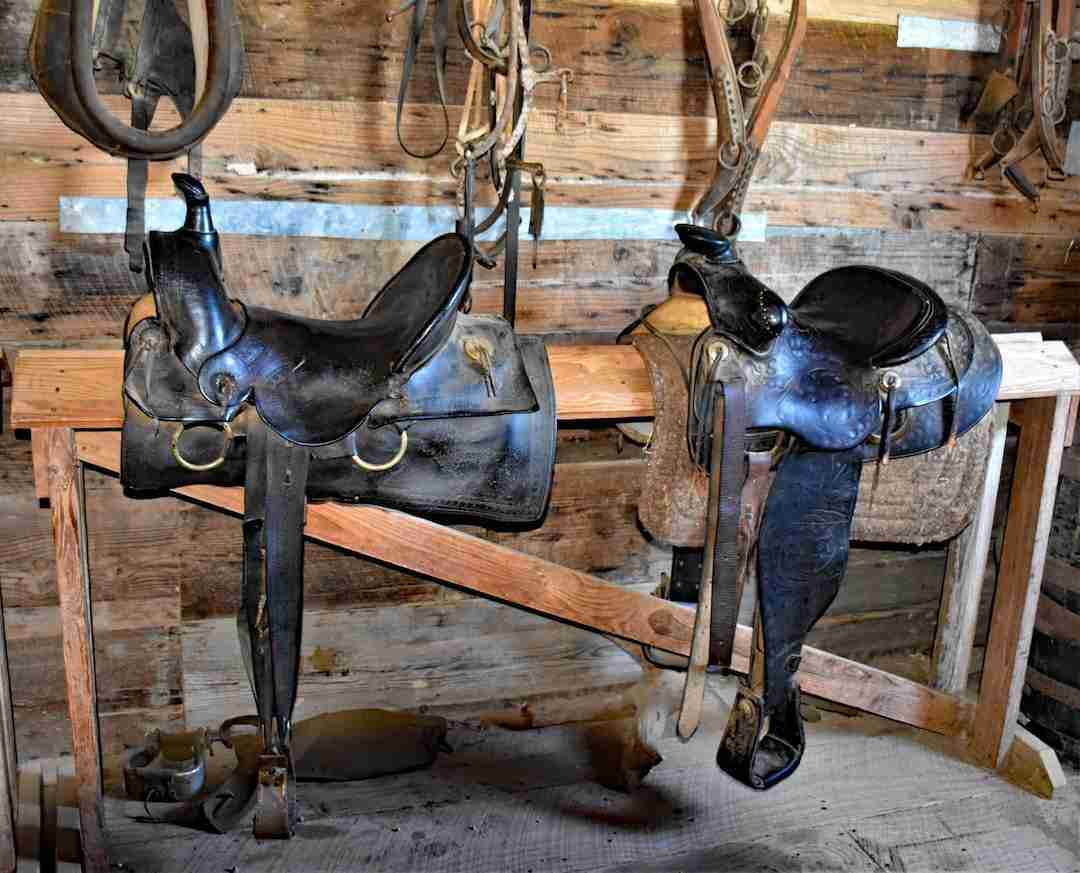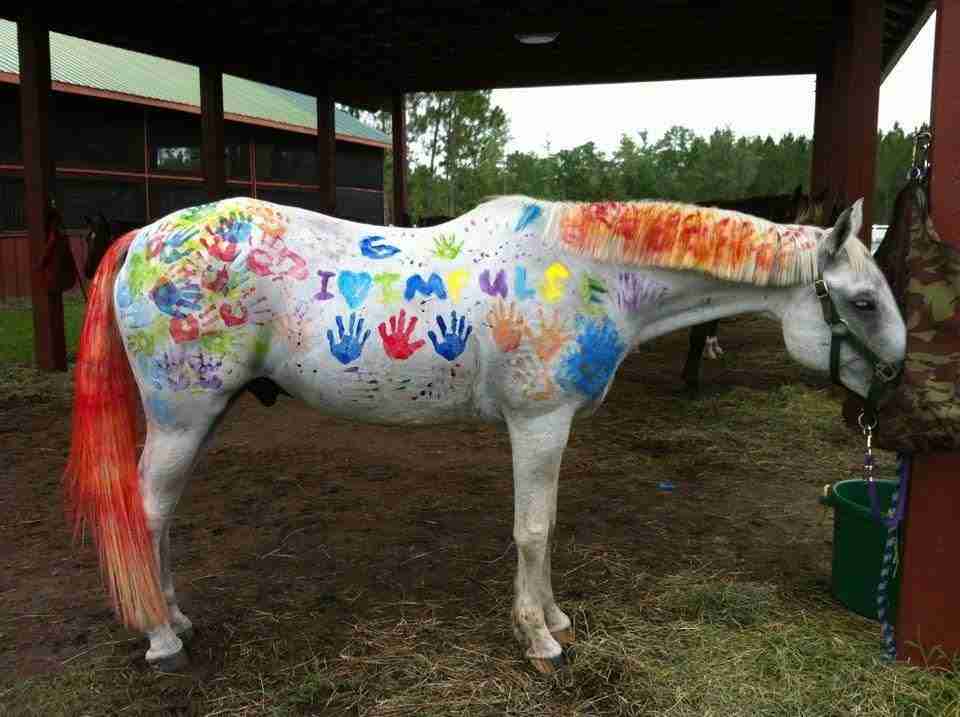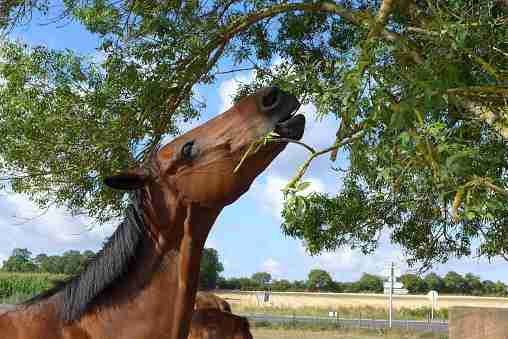Horse foaming at mouth can be a worrisome sight for any horse owner. If you are around horses enough, you will notice they foam at the mouth often. This is normal for them to do and is a good sign that your horse is functioning at its best! There are many reasons a horse may foam at the mouth – let’s find out!
Horses commonly foam at the mouth because they are relaxed, eating or drinking, or being ridden correctly. However, excessive foaming at the mouth can indicate an issue such as environmental irritants, disease, poisoning, bacterial infections, rabies, dental issues, choking, or overexertion.
A horse foaming at the mouth is no cause for alarm – most of the time, it is a good sign. In this post, you will discover all the information you need about why horses foam at the mouth so you can systematically rule out the cause for your horse foaming at the mouth in one quick read!
Why Do Horses Foam At The Mouth?
A horse foaming at the mouth is rarely a cause for alarm. In fact, it is a very natural thing that happens when their saliva comes into contact with air and friction! However, foaming at the mouth can also be a warning sign that something else is going on and needs to be checked out.
1. Foaming At The Mouth: Good Signs
The most common reason that horses foam at the mouth is because the horse is relaxed, is being ridden correctly, and is eating or drinking.
Before getting into these three reasons, you need to know why horses do not typically drool or normally salivate (like us) but rather experience foaming at the mouth – the secret is something called latherin .
Latherin is a protein found in both horse sweat and saliva. It is a surface-active ingredient meaning that the moment the latherin comes into contact with friction and air, it begins to activate, and this activation process is indicated by foam.
Why foam? Unlike normal sweating, foam is desirable for horses because it helps cool them down rapidly. The foam-like substance moves easily to the surface through the dense hairs of a horse and allows for rapid cooling. In pure liquid form, the sweat would become trapped under the hairs and would not cool the horse down efficiently.
When it comes to its benefits in the saliva, the foaminess of the saliva helps horses chew and digest dry foods, which is their main diet.
Now that we know about latherin, let’s dive into some good reasons a horse might be foaming at the mouth!
2. They Are Relaxed
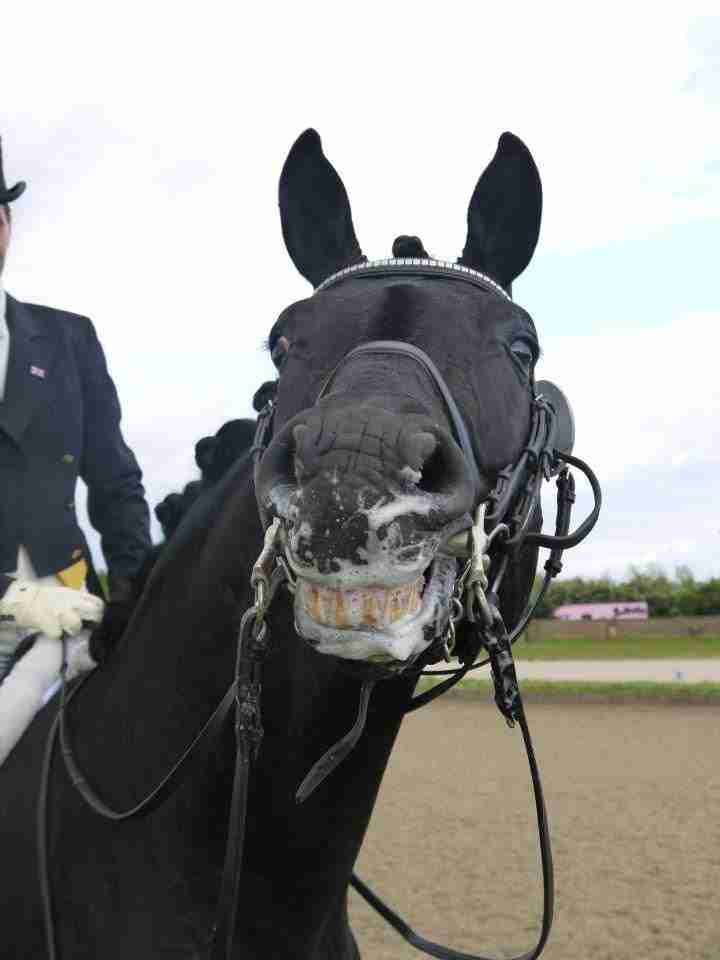
First and foremost, foam at the mouth can signify that your horse is relaxed while being ridden.
Specifically, in dressage training, this is an indication that a horse is not resisting the bit but is accepting of it. A relaxed horse will move the bit around slightly in its mouth. This leads to foam because air bubbles introduced into the saliva during the movement of the mouth activate the latherin mentioned previously.
When a horse is tense, it does not move its jaw at all but rather suctions its lips and tenses its neck. When this happens, the lack of movement and air bubbles interacting with the saliva prevents foam from forming. This is one of the ways in which horse riders can tell if their horse is tense or stressed.
Foam is such a desirable sign that some riders will give their horse foods that promote saliva, such as sugar, before riding.
3. Holding The Correct Riding Stance
Foam at the mouth can also indicate that you have the correct riding stance and that your horse is comfortable!
If a horse is being ridden incorrectly (e.g., the rains are too tight), it may lead to the horse being placed in an improper posture. In certain positions, the incorrect posture can interfere with and inhibit the horse’s salivary duct, leading to a lack of saliva and foam at the mouth.
Importantly, excessive saliva can also indicate a bad riding stance – for example, if a horse’s head is held too high up, it may not be able to swallow, leading to too much saliva in its mouth.
If you are riding your horse correctly, you should notice a healthy amount of foam around its mouth! If the volume of foam decreases or increases drastically during the ride, you may need to correct your riding stance.
4. Eating Or Drinking
When eating or drinking, foam at the mouth is a common occurrence.
The foam in the saliva, caused by latherin, is an essential evolutionary trick to help the horse easily digest its food. Horses eat notoriously dry foods, and the foam is used to help better chew, swallow and digest such dry foods.
Certain foods produce more foam than others. Should you be concerned that your horse is too foamy while eating, try removing sugary foods from their diet and see if this helps. Carrots and apples are examples of foods with high sugar content, and they will promote greater saliva production than other foods.
5. Foaming At The Mouth: Warning Signs
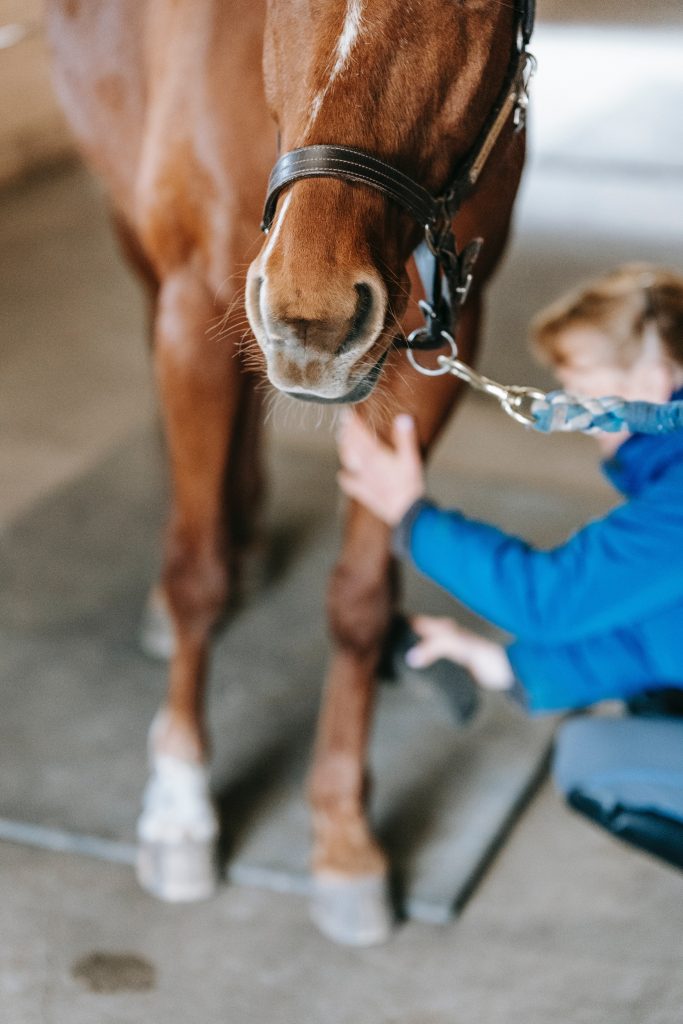
We now know the most common reasons that horses foam at the mouth, but sometimes foaming can be a warning sign something else is going on.
Hypersalivation is a term used to describe excessive salivation and foaming. There are many causes for hypersalivation, and although rare, it is encouraged that all horse owners take note of potential causes to ensure early intervention should a problem arise.
6. Environmental Irritants
Environmental irritants such as plants or other objects may lead to excessive salivation and foaming at the mouth. While not harmful long-term, these substances can create intense irritation for the horse, and removal of the item is vital.
There are two types of irritants to look out for (1) chemical irritants and (2) mechanical irritants.
Chemical irritants are substances within plants or materials. Mechanical irritants are features of an object thatcreate injury, such as thorns on a tree or splinters from wood.
If you notice your horse foaming at the mouth excessively throughout the day, not only when it is eating or being ridden, something in its environment may be creating irritation. Commonly, environmental irritants also lead to ulcers in the mouth.
Importantly, ulcers as a result of both chemical and mechanical injury look very similar, so it can be hard to identify the exact mechanism.
The best way to identify the cause is to see what had changed in the horse’s environment when the foaming started. It could be a change in the clothes you wear while riding, a new paint coating, toys, or maybe your horse has changed fields, and an unfamiliar plant is leading to irritation.
Some plants to look out for that create irritation, ulcers and foaming are:
- Burdock
- Raspberry Canes
- Foxtail Awns
- Sandbur
- Buttercups
- Marsh Marigolds
Most environmental irritants can be solved simply by removing the irritant, but if the problem persists, you must seek immediate medical attention for your horse.
7. Disease
Many diseases create issues for horses. A common disease that many horse owners are aware of is something called Vesicular Stomatitis, and this is often associated with excessive foaming at the mouth.
This is caused by a virus that is present in flies and midges. When horses nip at flies or bugs crawling in their fur, they can pick up this virus.
To identify this disease, symptoms that are associated with Vesicular Stomatitis are:
- Blisters in and around the mouth and nose
- Fever
- Difficulty eating
- Weight loss
- Lame and lethargic lame
Vesicular Stomatitis is not fatal, and with the correct treatment from the vet, your horse will be ready to go after no time!
8. Poisoning
A serious cause of excess salivation is poisoning – usually due to contact with a poisonous plant. Unlike chemical and mechanical irritation, this substance can enter the horse’s bloodstream and lead to serious illness.
Black Patch Disease is highly associated with excessive salivation and foaming. This results from a horse coming into contact with a plant called Red Clover, which is highly toxic to horses.
Other signs and symptoms of Black Patch Disease are:
- Fever
- Sweat
- Coughing
If you suspect your horse has come into contact with Red Clover, then it needs to see avet immediately. One of the earliest signs of Black Patch Disease is excess salivation – so the moment you notice this symptom get to the vet. If left untreated, it can be fatal.
9. Slobbers/ Slaframine Poisoning
Slobbers is a term used to describe horses who suddenly begin to slobber or droolexcessively – this is frequently accompanied by foam at the mouth.
Slobbers occur when a horse is exposed to a fungus called Rhizoctonia leguminicola. This fungus creates slaframine, which activates a horse’s parasympathetic nervous symptoms and increases saliva production and foaming.
The Slobbers commonly occur in colder, wetter weather since that is when fungi thrive, so identifying it can be quite easy as the time of the year is a simple indicator.
The four things this fungus commonly grows on:
- Red Clover
- White Clover
- Alsike Clover
- Alfalfa
Although this issue is not life-threatening, horses who are not removed from areas with these fungi and are repeatedly exposed can experience more severe symptoms such as choking, colic, diarrhea, and bloating.
10. Bacterial Infections
Since horses are outdoor animals, they can be exposed to various bacteria that may create unwanted symptoms. Some bacteria lead to excessive salivation and foam at the mouth.
Below you will find a table with two common bacterial infections in horses and some additional helpful info!
| Name | Bacterial Cause | Common Symptoms | Prognosis |
| Wooden Tongue Condition | Actinobacilluslignieresii – a bacteria found in soil and manure | – Abscess on the tongue – Excess salivation and foaming at the mouth | If treated early enough, it can result in recovery |
| Equine Grass Sickness | The cause is unknown. It has been linked to the Clostridium botulinum bacteria | – Colic – Difficulty Swallowing – Sweating – Muscle Tremors – Excess salivation and foaming at the mouth | Treatment is rarely successful and commonly results in death. |
11. Rabies
The last illness that may cause ahorse to excessive foam at the mouth is rabies.
It is very uncommon for horses to get rabies as most are vaccinated against it – so it should not be at the top of your list of things to check for. Although, knowing other symptoms are a good way to identify rabies quickly, such as:
- Extreme aggression – biting/ bucking
- Unfamiliar vocalizations
- Restlessness
12. Dental Issues
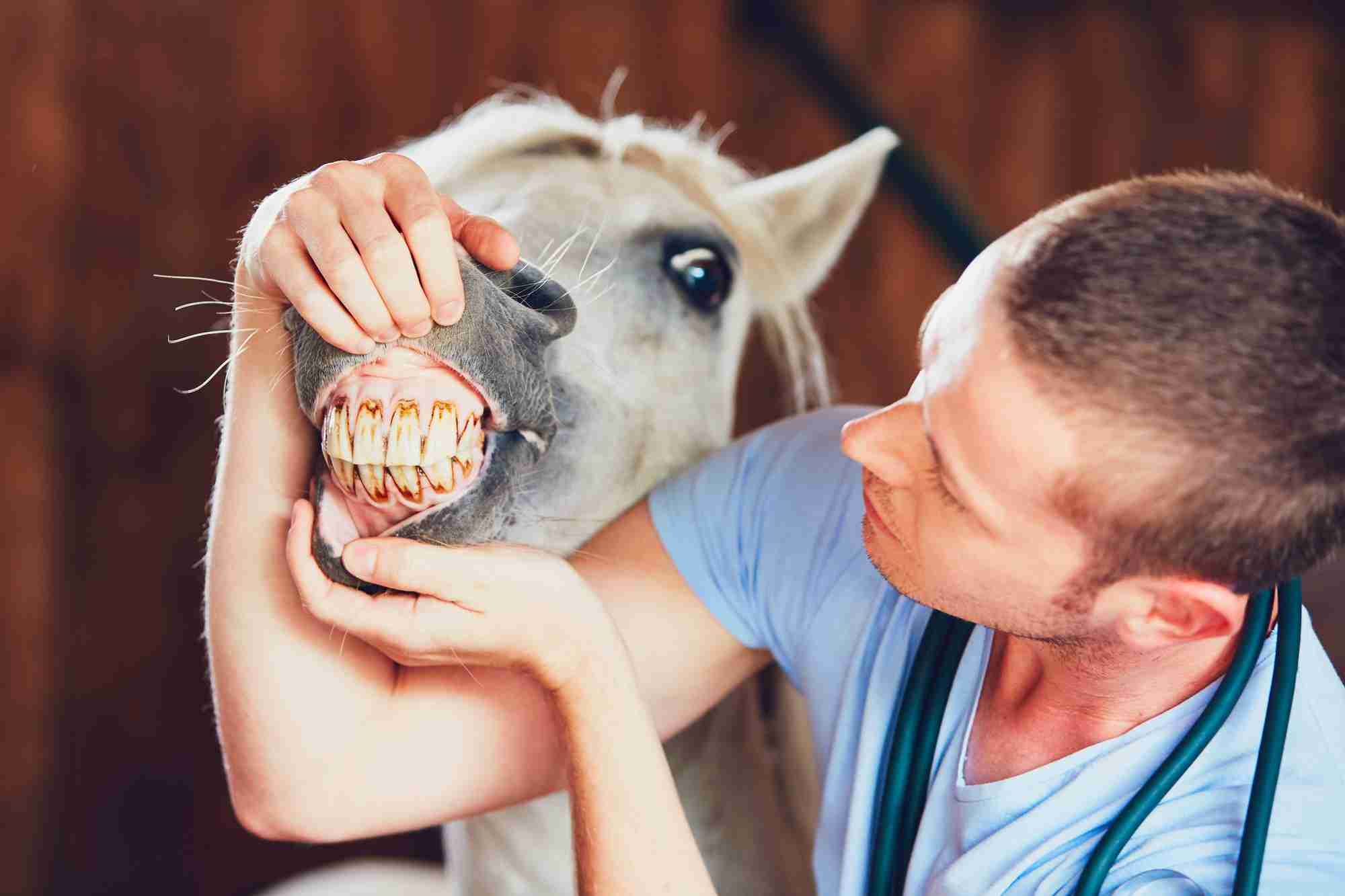
As humans, we can all relate to frequent dental issues – horses are no different! These gorgeous animals also have their fair share of dental problems throughout life, and a common sign of this is excessive foaming at the mouth.
Various dental issues can be at fault, but a common one is a single sharp tooth irritating your horse’s gums. As horses’ teeth grow, they are responsible for grinding them down – when they do not grind their teeth down evenly, sharp edges occur and can irritate the gum lining.
One way to identify gum issues is to see if there is any blood in the saliva. Blood indicates that the gums may be bleeding from ulcers or infections, and your horse urgently needs to see a vet.
It is good practice to check your horses’ teeth every once in a while to prevent any dental issues.
13. Choking
Lastly, a horse may be foaming at the mouth because it is choking on an object.
While foraging in the field, your horse may pick up something strange, which can get lodged in its throat. Choking is a fairly obvious thing to identify – a horse will cough consistently and excessively foam at the mouth. Immediate assistance is vital!
14. Overexertion
When a horse is overworked and exhausted, it may foam at the mouth excessively.
An overexerted horse can be difficult to identify purely via foaming at the mouth if you do not know the horse well enough. Some horses foam more than others, so purely relying on this indicator can be problematic.
Aside from excessive foam, some other helpful ways to tell if a horse is overexerted and fatigued:
- Reduced coordination
- Slowing pace
- Increased head and neck movement
- Greater breathing effort
- Lack of interaction or response to aids
- Constant fluctuations in pace during a jog or lope
Conclusion
In conclusion, horses foam at the mouth for many reasons. The common reasons are that the horse is relaxed, is eating, or you are riding correctly. Some unfavorable reasons a horse may foam are environmental irritants, disease, bacterial infections, poisoning, rabies, dental issues, choking, or overexertion. Most unfavorable situations are remedied easily with a quick visit to the vet!
Resources
https://www.helpfulhorsehints.com/why-horses-foam-at-the-mouth/
https://animals.mom.com/what-does-it-mean-when-a-horse-foams-at-the-mouth-8051687.html
https://petkeen.com/why-do-horses-foam-at-the-mouth/
https://www.google.com/search?q=why+do+horses+foam+at+the+mouth&source=lnms&tbm=vid&sa=X&ved=2ahUKEwjk37fotuT7AhVQfMAKHcQFAEoQ_AUoA3oECAIQBQ&cshid=1670310412722885&biw=1280&bih=664&dpr=2#fpstate=ive&vld=cid:26cbde6c,vid:DcxG893G1Cc
https://thehorse.com/149850/hypersalivation-in-horses/
https://www.thesprucepets.com/slobbers-or-slaframine-poisoning-in-horses-1886006
https://www.sciencedirect.com/topics/medicine-and-dentistry/actinobacillus-lignieresii#:~:text=Actinobacillus%20lignieresii%20is%20an%20aerobic%2C%20nonmotile%2C%20non%2Dspore%2D,and%20reproductive%20tracts%20of%20ruminants.
https://animalmicrobiome.biomedcentral.com/articles/10.1186/s42523-021-00131-2
https://www.bhs.org.uk/horse-care-and-welfare/health-care-management/horse-health/equine-diseases/equine-grass-sickness-egs/
http://omafra.gov.on.ca/english/livestock/horses/facts/info_slobbers.htm#:~:text=Mechanical%20or%20chemical%20irritation%20results,frothy%20saliva%2C%20or%20oral%20ulcers.
https://eurodressage.com/2019/04/11/swallowing-frequency-cantering-horses-effects-different-bits-and-bridles#:~:text=The%20presence%20of%20foamy%20saliva,accompanied%20by%20salivation%20and%20chewing.
https://www.horseandhound.co.uk/features/the-signs-of-equine-fatigue-294522






